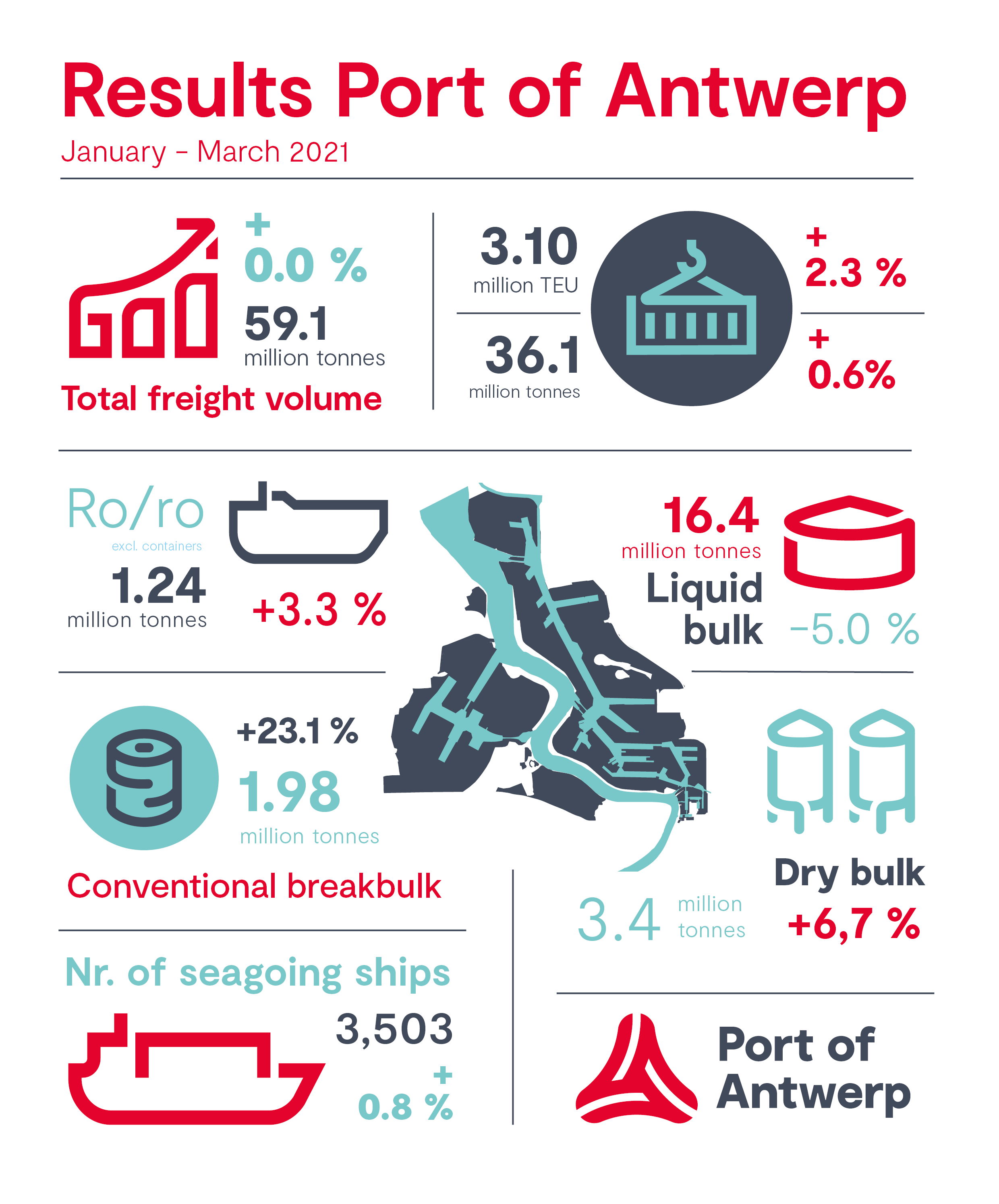Port of Antwerp holds its own in Q1 despite Brexit and corona crisis
Slight growth in container throughput - strong quarter for breakbulk
The total throughput of Port of Antwerp remained stable at 59,1 million metric tonnes compared with the same period last year. Despite the impact of the ongoing coronavirus crisis and Brexit, all goods flows except liquid bulk recorded growth. For the coming period, it remains to be seen what the impact will be of the incident in the Suez Canal. Port of Antwerp anticipates busy terminals where possible.
First quarter record equalled despite ongoing corona crisis
Container throughput grew by 0.6% (metric tonnes) and 2.3% (TEUs) in Q1 2021 compared with Q1 2020, which started strongly and then saw a downturn due to the initial effects of the pandemic in March 2020. January 2021 saw a continuation of the strong performance seen in autumn 2020, although a number of operational challenges hampered the operation of the container terminals. For example, there were long delays in arrivals of container ships as a result of the coronavirus crisis. The severe cold snap in February had an additional negative impact on container handling and the effects of this continued into March. The Suez Canal incident will cause further delays to container ship calls and operational challenges throughout Q2.
The breakbulk segment had its best quarter since Q2 2019. The throughput of iron and steel, the most important goods group in this segment, increased by 18.2% due to a peak in the supply of steel, which can be explained amongst others by the new import quotas that took effect on 1 April. The RoRo throughput remained stable compared to Q1 2020, both in new and used vehicles.
Dry bulk throughput increased by 6.7%. Apart from growth in the throughput of non-ferrous ores and scrap, this growth was found mainly in the throughput of fertilizers (+40.7%). The throughput of fertilizers within a single quarter is unprecedented in the last decade. Liquid bulk recorded a drop of 5%, mainly due to a sharp decline in the throughput of crude oil. Derivatives saw a slight decrease (-1%) compared with Q1 2020, while chemicals saw a modest increase of 4.4%.

Impact of the Suez Canal Incident
As a result of the incident in the Suez Canal, Port of Antwerp expects higher levels of traffic in the terminals in the coming weeks. Port of Antwerp is keeping its finger on the pulse with the shipping companies and the container terminals to see where space can be created for containers. For example, some terminals have already decided not to allow the arrival of containers for export at the terminal until a few days before they can be loaded. We are also looking at how we can optimise storage capacity inland and make even greater use of inland navigation and rail. It is important to work closely with the entire chain to make the best possible use of the available capacity.
Jacques Vandermeiren, CEO Port of Antwerp: "We have faced several disruptions in the global supply chain over the last year: the pandemic, Brexit, the Suez incident ... In these challenging times, Port of Antwerp is proving its agility and resilience. The global spread over different shipping areas, the large storage capacity, and the professionalism and efficiency of Antwerp's port community are the basic ingredients of our success."
Annick De Ridder, Port Alderman: "Despite the difficult circumstances in which we started 2021, we are able to show that the port is holding its own. This is testament to the resilience of our port and of all the employees who work at the port platform. They are still ensuring that everything keeps running and that the port of Antwerp can continue to play its crucial role in provisioning our country and our economy."
%20(1).png)